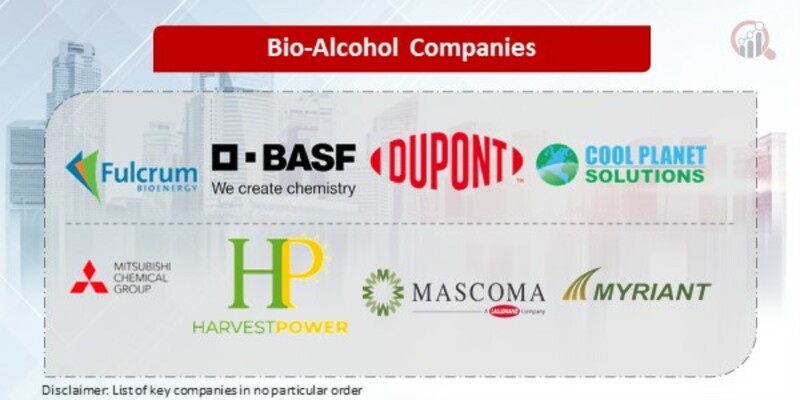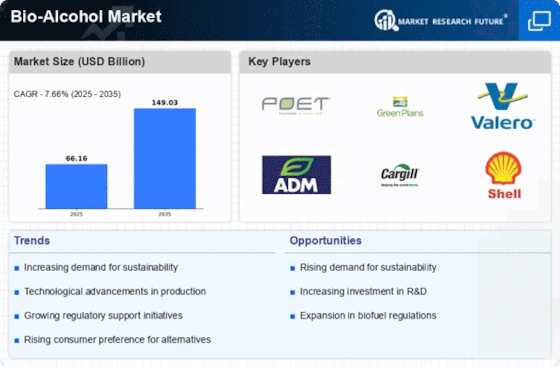Top Industry Leaders in the Bio Alcohol Market

Bio-alcohol, a spirit with a green soul, is no longer just a party starter. This renewable fuel, derived from biomass like sugarcane, corn, or even algae, is increasingly powering vehicles, industries, and even homes. The global bio-alcohol market is making it a sizzling battleground for manufacturers vying for a share of the eco-conscious pie. Let's raise a toast to the strategies, factors, and developments stirring this dynamic concoction.
Strategies Raising the Ethanol Bar:
- Feedstock Diversification: Moving beyond traditional corn-based ethanol, companies like Gevo are exploring cellulosic biomass like wood chips and agricultural waste, expanding feedstock options and reducing reliance on food crops.
- Technological Innovation: R&D labs are bubbling with advancements. Companies like Butamax are pioneering advanced fermentation technologies to improve ethanol yield and efficiency, squeezing more mileage out of every drop.
- Green Credentials: Sustainability is the secret ingredient. Companies like Amyris are investing in bio-alcohol production from non-food crops like jatropha, minimizing environmental impact and aligning with eco-conscious consumers.
- Regional Expansion: Asia-Pacific, with its thirst for fuel and environmental concerns, is a fertile ground. Companies like Raizen are establishing production facilities in this region to capitalize on the local demand.
- Strategic Partnerships: Collaboration fuels the engine. For instance, Poet partnered with airlines to provide sustainable aviation fuel (SAF) made from bio-alcohol, expanding market reach and decarbonizing the aviation industry.
Factors Dictating Market Share:
- Ethanol Powerplay: Superior ethanol yield, fuel efficiency, and engine compatibility are crucial selling points. Established brands like Archer Daniels Midland have built reputations for consistent performance, attracting loyal customers.
- Cost-Competitiveness: Price remains a critical factor, particularly in mature markets. Brazilian ethanol producers often offer lower prices, challenging established players to optimize production and pricing strategies while maintaining quality.
- Policy Landscape: Government incentives and carbon emission regulations drive demand. Players who comply with these regulations, like EQT Corporation with its renewable diesel blends, gain a competitive edge.
- Feedstock Availability: Reliable access to sustainable feedstocks is key. Companies with diverse procurement strategies and investments in biomass cultivation, like BP, have an advantage.
Key Players:
-
Fulcrum Bioenergy Inc.
-
BASF SE
-
E.I. du Pont de Nemours & Co.
-
Cool Planet Energy Solutions
-
Mitsubishi Chemical Corporation
-
Harvest Power Inc.
-
Mascoma LLC
-
Myriant Corporation
Recent Developments:
-
September 2023: Amyris expands its production capacity for jatropha-based bio-alcohol in Colombia, aiming to tap into the South American market and reduce reliance on fossil fuels. Butamax secures funding for a new production facility utilizing its innovative fermentation technology for high-performance biobutanol.
-
October 2023: Raizen acquires a bio-ethanol producer in China, strengthening its presence in the world's largest bio-ethanol market. Cosan launches a line of bio-based chemicals derived from sugarcane ethanol, targeting the growing green chemicals market.
-
November 2023: Poet collaborates with a major airline to supply SAF for transatlantic flights, showcasing the viability of bio-alcohol in aviation.
-
December 2023: A consortium of research institutions receives government funding to develop genetically modified yeast strains for more efficient bio-alcohol production, paving the way for further technological advancements.











